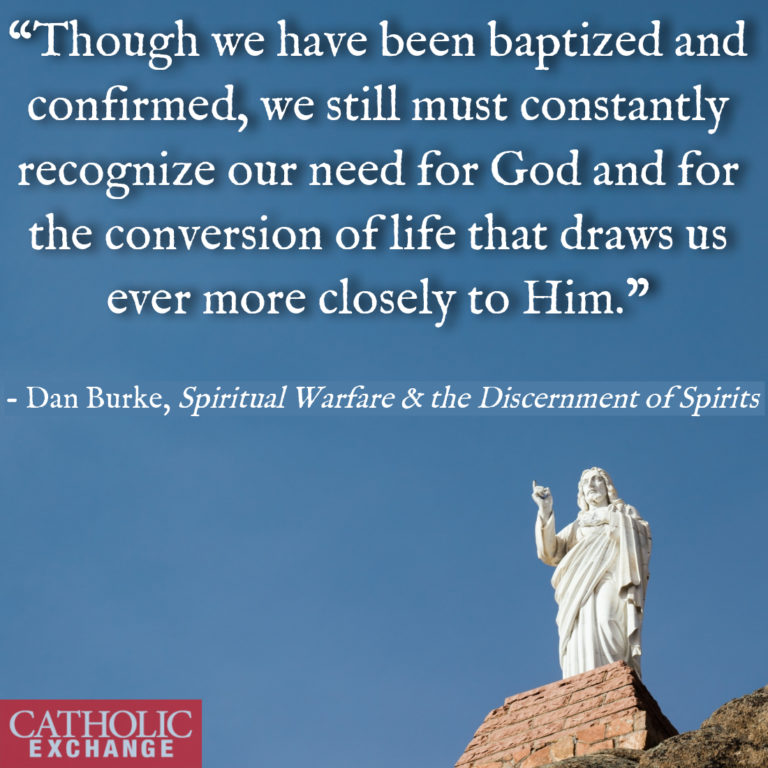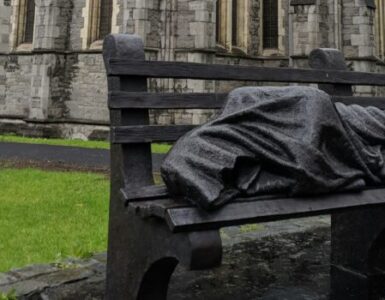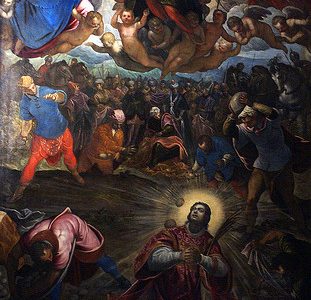For those who live according to the flesh set their minds on the things of the flesh, but those who live according to the Spirit set their minds on the things of the Spirit. To set the mind on the flesh is death, but to set the mind on the Spirit is life and peace.
— Romans 8:5–6
I have struggled many times with aridity in prayer. I didn’t even know the term aridity until I stumbled across it and my eyes were opened to this common spiritual challenge. When I became Catholic, I experienced a rapid healing — in particular through the writings of St. Teresa of Avila and a Jesuit priest, Jean-Pierre de Caussade.
In Teresa I found a kindred soul — one that understood what a real relationship with Jesus looked like. In de Caussade I found a way to see a vision of God in all things, in every moment. These writers helped to reinforce my commitment to prayer and to filling my mind with truth. This helped me to better see God and yield to Him as I experienced circumstances and situations that brought fear, anxiety, and despair to the surface — to be healed.
Next I encountered the wisdom of St. Ignatius of Loyola through the indispensable writings and reflections of Fr. Timothy Gallagher, O.M.V. This was the beginning of the end of the final strongholds that seemed to be too strong to be overcome.
My aim now is to move from my personal story into what I would call a simplified understanding of the practice of discernment of spirits.
Foundations of Discernment, Path to Peace
Some important foundational truths must be understood. They are what I would call a Paradigm of Ascent and are the necessary foundations of discernment and the path of healing and peace that God has provided for all of us. These truths are foundational in that if they are not all present in some substantive way, the practice of discernment of spirits is impossible to follow and the promise of peace is impossible to experience.

First Foundation: A “Yes” to God
The first foundational truth is that we must have an authentic “yes” in our heart to God to begin and complete the journey of healing in heaven. It is not enough to merely know about God or even to practice our faith — we must know him intimately. This is the path of the mystics, but it is also the path to heaven.
This path is often obscure to most Catholics because it is not common for someone already in the Church to hear a call to conversion. However, this call to conversion and even the warnings of hell were offered frequently by Jesus to those who were His close followers. Though we have been baptized and confirmed, we still must constantly recognize our need for God and for the conversion of life that draws us ever more closely to Him.
Second Foundation: Confession & the Eucharist
The second foundational element is the most important support for our “yes” of the heart, and it consists of two of the sacraments, the Eucharist and regular confession. The Eucharist is the most powerful sustenance of our faith, and we should pursue participation in the Holy Sacrifice of the Mass as frequently as possible.
The Sacrament of Penance and Reconciliation is also absolutely necessary to support our “yes.” Too often we underestimate the power of this sacrament. We might think of it merely as a remedy for sin, which is vital and true, but it is also a great grace to strengthen us against falling into sin. The Sacrament of Penance both provides forgiveness of sins and strengthens us in our efforts to fight sin. Regardless of either emphasis, if we are not reconciled to God and not living in a state of grace, we are cut off from the life of grace and will not be able to discern the difference between the inspirations of God and the temptations of the devil.
Because of the poor catechesis of our time, I must be clear. Living in a state of grace means that we are living without having unconfessed mortal sins, and we are following the teachings of the Church.
Third Foundation: Daily Prayer
The third foundational element to authentic and effective discernment is daily prayer. The most powerful daily prayers are twofold: mental prayer and the Rosary.
Sts. Teresa of Avila and Alphonsus Liguori consider daily mental prayer as necessary for salvation because of the impact on the soul of those who daily draw near to their Savior. The Rosary, as revealed by our Blessed Mother, is necessary both for our salvation and that of the world.
Together, these two daily prayers provide both protection and a kind of shield and nurturing to our “yes” that allow us to move forward in faith.
Fourth Foundation: Ascesis
The fourth foundational element to our discernment is ascesis. This ancient Greek word simply means “exercise.” In our usage, that exercise is to exert daily and deliberate effort away from sin and toward self-giving to God and our neighbor. Ascesis is simply self-giving and self-denial — saying “no” to the draws of our lower nature in order to say “yes” to giving ourselves completely to God and to those whom He has placed in our care or circle of influence. Ascesis is simply what it means to truly follow Jesus.
This final element completes what I like to call a “saint-making machine.” These basic elements are in place in the life of every saint and everyone who makes progress in the spiritual life toward God and peace and away from sin and the sorrows of sin. This Paradigm of Ascent is also the necessary basis for beginning to distinguish between the voice and influence of God and the voice and influence of the enemy of our souls.
As we begin to implement these practices, we will lay a foundation that is, in and of itself, the most powerful healing force we can know. We will begin living by what is known in Catholic Tradition as a “rule of life” or what we call in our community a “plan of love.” A plan of love is simply a set of concrete commitments that we make to God on a daily, weekly, or monthly basis. A simple plan of love might look something like this:
- Daily Mental Prayer — Wake up at 6:00 a.m.
and pray for ten minutes, focusing on the Gospel Reading of the day. - Daily Rosary — Pray one decade in the car on the way to work.
- Attend Mass every
Sunday without fail. - Go to confession every other week.
Fifth Foundation: Review Your Day
The final step in our foundation is what is known as an examen prayer, or an examination of conscience.
I encourage practicing the examen in a way that is focused on God’s redemptive power and mercy, not only our weakness. As St. Paul recalled, “He said to me, ‘My grace is sufficient for you, for my power is made perfect in weakness’ . . . for when I am weak, then I am strong.”
The approach I recommend looks something like this. At the same time every night before going to bed, take five minutes to review your day. Slowly go over your day from morning to evening, asking two simple questions:
1. What have I been able to do, by the grace of God, that is honoring to Him and others?
When you discover these things, express praise to God. This can be as simple as “Thank you, Lord, for the ability to pray according to my plan of love when I didn’t feel like doing so.”
2. How have I failed to honor God and others in my life?
When you discover these things, you still pray in thanksgiving something like this: “Thank you, Lord, for revealing my sin to me so that I can be forgiven and strengthened to overcome this sin in the future.”
Now, this may seem very simple — and it is. However, don’t be fooled. This powerful practice is no less important than a compass to someone seeking their way through the wilderness. It keeps us awake to our progress on the narrow way to heaven, and it helps ensure that we stay on the path.
✠
This article is adapted from a chapter in Dan Burke’s latest book, Spiritual Warfare and the Discernment of Spirits, available from Sophia Institute Press.
You can also read more about contemplative prayer in the book The Contemplative Rosary, also written by Dan Burke and co-authored by Connie Rossini.
Photo by Grant Whitty on Unsplash
















